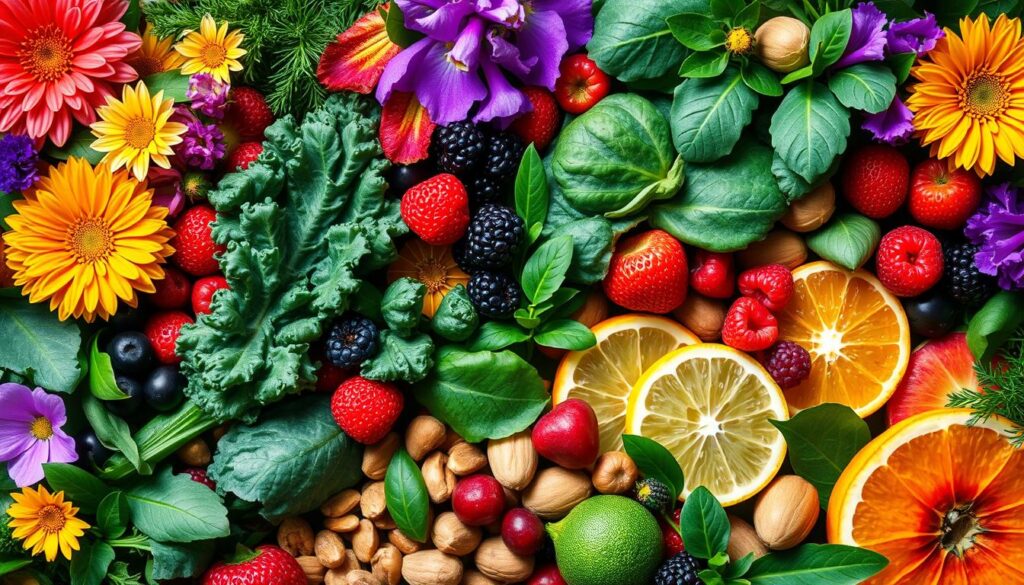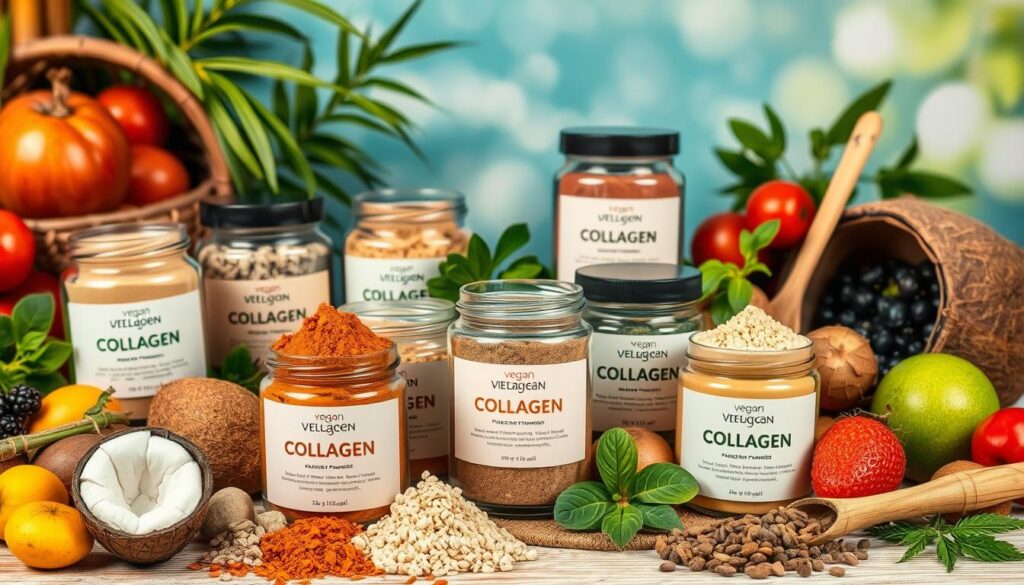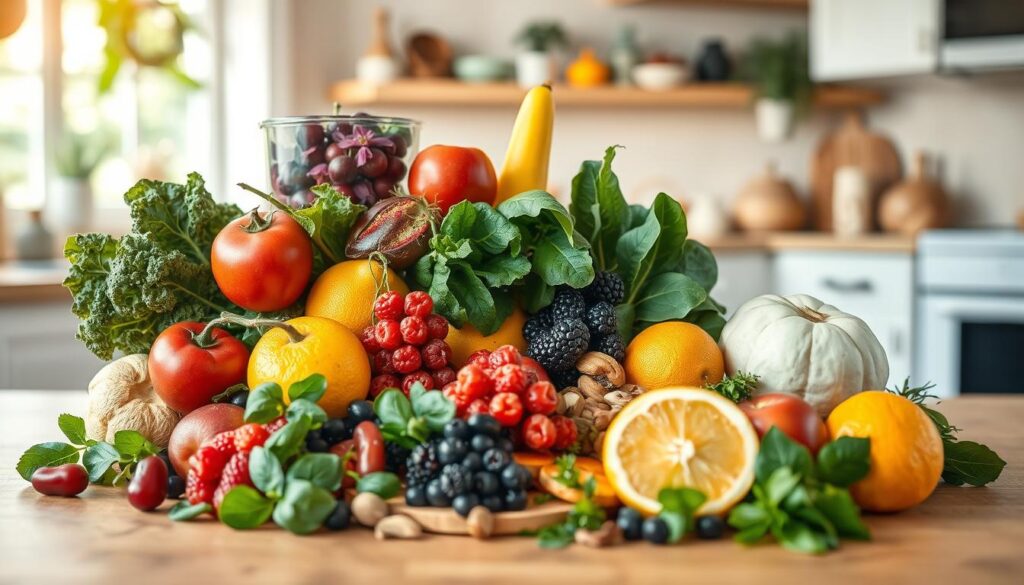If you’re vegan, you might know that regular collagen comes from animals. But, you can still help your body make collagen with a vegan diet and special supplements. This guide will show you how to boost your collagen levels. You’ll learn how to do this while staying vegan.
Key Takeaways
- Traditional collagen supplements often come from animal sources, making them unsuitable for vegans.
- Many plant-based foods and nutrients can promote the body’s natural collagen production.
- Vitamin C, amino acids, and essential minerals play crucial roles in collagen synthesis.
- Vegan-friendly collagen supplements offer an alternative to animal-derived products.
- Lifestyle factors like sun protection and exercise can also impact collagen levels.
Understanding Collagen: The Building Blocks of Health
Collagen is the most common protein in our bodies. It helps keep our skin elastic, bones strong, and joints healthy. But, traditional collagen sources aren’t vegan. Vegan collagen boosters and meat-free sources are now popular. They help our bodies make more collagen.
The Science Behind Natural Collagen Production
Collagen starts with procollagen, made from vitamin C and protein. The body uses amino acids like lysine, proline, and arginine to make collagen fibers. This is key for healthy skin, joints, and bones.
Why Traditional Collagen Isn’t Vegan
Traditional collagen comes from animal tissues like cows, pigs, and fish. So, it’s not vegan. Meat-free collagen sources are growing in popularity. They give the body nutrients to boost collagen production.
The Role of Collagen in Body Functions
Collagen is vital for our bodies. It keeps our skin smooth and elastic. It also helps our bones stay strong, joints healthy, and supports heart health.
“Consuming collagen peptides is more efficient than relying on diet alone to facilitate collagen production.”
Our bodies naturally make collagen, but production drops with age. This leads to signs like dull skin, fine lines, and wrinkles. Adding vegan collagen boosters to your routine can help. It supports your body’s collagen production and keeps you healthy.
The Truth About Vegan Diet Collagen: What You Need to Know
Vegans look for cruelty-free collagen options. But, there’s a catch. True vegan collagen doesn’t exist because it comes from animals.
But, vegans can still get collagen benefits. Eating a plant-based diet helps your body make collagen. This diet includes foods rich in vitamins and amino acids.
Some companies try to make vegan collagen with yeast and bacteria. But, this is still new. For now, eating right is the best way to support your collagen.
The Benefits of Vegan Collagen Boosters
Vegan collagen boosters aren’t real collagen. Yet, they can help a lot. They give your body what it needs to make collagen.
- Promote healthy, youthful-looking skin
- Support joint flexibility and mobility
- Contribute to strong, resilient bones and teeth
- Enhance the health of blood vessels and circulation
- Improve the appearance of hair, nails, and gums
Eating a diet rich in vitamins and plant proteins is key. This way, you can have healthy skin and joints. And you stay true to your vegan values.
Essential Nutrients for Natural Collagen Production
Keeping your collagen healthy is key for young, soft skin and strong joints. Eating foods rich in vitamins, minerals, and amino acids helps your body make collagen. Let’s look at the important nutrients for collagen making.
Vitamin C and Its Crucial Role
Vitamin C is very important for collagen. It helps keep collagen strong, which is good for your skin, joints, and tissues. You need 75-90 mg of vitamin C every day. You can get it from citrus fruits, strawberries, kale, bell peppers, papaya, and tomatoes.
Amino Acids: The Foundation of Collagen
Amino acids like glycine, lysine, and proline are the base of collagen. They help your body make collagen. Lysine is needed in 30 mg per kg of body weight. You can find it in tofu, beans, green peas, avocado, and mangoes.
Minerals That Support Collagen Synthesis
Some minerals are also key for collagen making. Zinc is needed in 11 mg for men and 8 mg for women. You can find zinc in cacao, pumpkin seeds, spinach, almonds, and chickpeas. Copper is needed in about 900 micrograms a day. It’s in sunflower seeds, almonds, cashews, shiitake mushrooms, and kale.
| Nutrient | Recommended Daily Intake | Plant-Based Sources |
|---|---|---|
| Vitamin C | 75-90 mg | Citrus fruits, strawberries, kale, bell peppers, papaya, tomatoes |
| Zinc | 11 mg (men), 8 mg (women) | Cacao, pumpkin seeds, spinach, almonds, chickpeas |
| Copper | 900 micrograms | Sunflower seeds, almonds, cashews, shiitake mushrooms, kale |
| Lysine | 30 mg per kg of body weight | Tofu, beans, green peas, avocado, mangoes |
| Proline | N/A | Cabbage, yogurt, mushrooms, sunflower seeds |
| Glycine | N/A | Seaweed, asparagus, spinach, sweet potatoes, whole grains, legumes |
Eating a variety of plant-based foods can help your body make collagen. This keeps your skin, joints, and overall health good. Remember, eating a diet rich in plant proteins for collagen is best. But, supplements can also help.
Plant-Based Sources of Collagen-Boosting Nutrients
Traditional collagen supplements come from animals. But, many plant-based foods can help your body make collagen. Eating these foods can make your skin look young, your joints strong, and you feel great.
Soy products, black beans, and kidney beans are good for collagen. Pumpkin seeds, sunflower seeds, cashews, and pistachios also help. Fruits and veggies with vitamin C like citrus fruits and berries are important too.
Zinc-rich foods like whole grains and legumes help with collagen. Eating different plant-based foods can help your body make collagen. This keeps you healthy from the inside out.
| Plant-Based Collagen Boosters | Nutrient Profile |
|---|---|
| Soy Products | Rich in amino acids for collagen synthesis |
| Black Beans | Excellent source of collagen-supporting amino acids |
| Pumpkin Seeds | High in zinc, a key mineral for collagen production |
| Citrus Fruits | Packed with vitamin C, crucial for collagen formation |
| Leafy Greens | Contain vitamins and antioxidants that support collagen |

Eating plant-derived collagen-boosting foods is good for your vegan diet. It helps your body make more collagen. This makes you healthier and more energetic.
The Power of Superfoods in Collagen Production
Superfoods are great for boosting your body’s vegan collagen. They are full of good stuff like vitamins and antioxidants. These foods help keep your collagen levels healthy. Let’s look at some superfoods that can help your plant-based collagen a lot.
Aloe Vera Benefits
Aloe vera is amazing for your collagen. It has special helpers that make your skin heal and stay elastic. Eating aloe vera or using it on your skin can make your skin look young and soft.
Bamboo Silica for Enhanced Results
Bamboo is full of silica, a key mineral for collagen. Silica makes collagen stronger, which is good for your hair, skin, and nails. Using bamboo silica in your diet or through supplements can help your vegan collagen boosters work better.
Antioxidant-Rich Foods
It’s important to protect your collagen too. Foods like berries and green tea are full of antioxidants. They help keep your collagen safe from harm. These foods are great for your skin’s health.
Adding these superfoods to your plant-based diet helps your body get what it needs. Your skin, hair, and nails will thank you. Nature’s superfoods can help your body make more vegan collagen.
Vegan Collagen Supplements: Types and Benefits
As we get older, our bodies make less collagen. We lose about 1% of our collagen each year from our early 20s. By 30, we’ve lost about 10% of our collagen. This loss can cause wrinkles, sagging skin, and joint pain.
But, there’s a good solution for vegans and health lovers – vegan collagen supplements. These supplements are made from plants. They help our bodies make more collagen without using animal products.
The Power of Vegan Collagen Supplements
Vegan collagen supplements have vitamins, minerals, and plant extracts. They help our bodies make more collagen. Some key ingredients are:
- Vitamin C, important for collagen and skin health
- Ceramides, keep skin moist and elastic
- Vitamin B12, helps cells grow and repair
- L-Lysine, an amino acid for collagen
- Vitamin B9, helps make new collagen fibers
- Arginine, another amino acid for collagen
These nutrients in vegan collagen supplements can make our skin, hair, nails, muscles, joints, bones, and gut healthier.
| Ingredient | Role in Collagen Production |
|---|---|
| Vitamin C | Crucial for collagen synthesis, skin health, and wound healing |
| Ceramides | Maintain skin’s moisture and elasticity, supporting collagen structure |
| Vitamin B12 | Essential for cell growth and repair, aiding in collagen formation |
| L-Lysine | An amino acid that contributes to the production of new collagen fibers |
| Vitamin B9 | Helps in the production of new collagen fibers, supporting skin health |
| Arginine | An amino acid that plays a role in collagen synthesis |
Vegan collagen supplements are a plant-based option. They’re great for vegans, people with shellfish allergies, and those with dietary restrictions.

If you want to look younger, support your joints, or just feel better, vegan collagen supplements are a good choice. They offer a plant-based way to boost collagen and live a healthier life.
Lifestyle Factors That Affect Collagen Production
Keeping a healthy lifestyle is key for making collagen in your body. Eating well, like a vegan diet, gives your body what it needs. But, your lifestyle also plays a big role in how young your skin looks and feels.
Sun Protection and Skin Health
Too much sun can hurt your skin’s collagen. The sun’s rays can damage collagen and slow down making new one. Always use sunscreen with SPF 30 or higher when outside.
Hydration and Exercise Impact
Drinking lots of water is also important for collagen. It keeps your skin flexible and helps your body make collagen better. Exercise also helps by getting nutrients to your skin.
Try not to do things that harm collagen, like smoking or drinking too much alcohol. Adding these healthy habits to a vegan diet rich in ethical collagen can keep your skin looking young and healthy.
| Lifestyle Factor | Impact on Collagen Production |
|---|---|
| Sun Exposure | UV rays can break down existing collagen and slow production |
| Hydration | Drinking enough water supports skin elasticity and collagen utilization |
| Exercise | Physical activity promotes circulation and nutrient delivery to the skin |
| Smoking and Alcohol | Can degrade existing collagen levels |
By adding these healthy habits to a vegan diet rich in cruelty-free collagen, you can keep your skin looking young and healthy.
Common Myths About Plant-Based Collagen
There are many myths about vegan diet collagen. One big one is that plant-based collagen is the same as animal collagen. But, vegan options help your body make collagen, they don’t give it to you.
Some people think a vegan diet can’t give you enough nutrients for collagen. But, a good vegan diet collagen plan has all the vitamins and amino acids you need. Vegan collagen supplements can help, but results can differ.
It’s key to know the truth about plant-based collagen. By understanding how vegan collagen works, you can choose better for your health.


A Life-Changing Experience with This Weight Loss Supplement (Nagano Tonic)
I’ve always struggled with finding a weight loss solution that actually works for me. Like many, I’ve tried numerous diets, exercise routines, and supplements over the years—some worked for a short time, but nothing ever gave me long-term results. That was until I decided to try the weight loss supplement I found : Link to the Supplement.
From the moment I started using it, I noticed a difference. Not only did I feel more energized, but my cravings also became more manageable. The best part? I started seeing results much quicker than I anticipated! Over the course of just a few weeks, I noticed a significant reduction in belly fat and overall weight loss that I hadn’t been able to achieve before.
What makes this supplement stand out from all the others I’ve tried is how it supports me in my daily routine without any jitters or energy crashes. I’m able to stay focused and motivated, which has made it easier to stay on track with my diet and exercise plan.
This product truly exceeded my expectations, and I feel more confident and healthier than ever before. If you’re struggling with your weight loss journey like I was, I highly recommend giving this supplement a try. It’s been a game-changer for me, and I’m sure it can work wonders for you too!
Contant Them on email .. tonicnagano50@gmail.com
I’ve tried so many weight loss products over the years, but nothing worked like this supplement! Since I started using it, I’ve noticed a big difference in my energy levels and appetite control. In just a few weeks, I’ve lost weight and feel so much better. It’s been easy to stick with, and the results speak for themselves. Highly recommend this to anyone looking to make a real change!
wasn’t sure what to expect, but this weight loss supplement has really impressed me! After just a few weeks of use, I’ve already dropped a few pounds and feel more motivated to stay active. It’s helped curb my cravings and boosted my energy throughout the day. I’m excited to keep going and see even better results. Definitely worth trying!
Reach them on tonicnagano50@gmail.com
I was skeptical at first, but this supplement has truly made a difference in my weight loss journey. I’ve lost weight without feeling deprived or sluggish. My cravings are under control, and I feel more confident in my body. It’s easy to incorporate into my daily routine, and the results speak for themselves. I’m so glad I gave it a try!
Thanks David, i do use the link to make my purchase. you can get too here http://surl.li/iasppy
I’ve tried so many weight loss products, but this one has been by far the most effective. In just a few weeks, I’ve noticed a visible difference in my body and energy levels. It’s helped me stay on track without the constant hunger pangs and cravings. I’m really happy with my progress and can’t wait to see where I’ll be in another month!